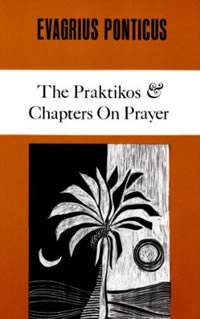Book Notes
 Evagrius of Ponticus, The Praktikos and Chapters on Prayer, translated and with an introduction and notes by John Eudes Bamberger (Kalamazoo: Cistercian Publications, 1972, 1981), 96pp.
Evagrius of Ponticus, The Praktikos and Chapters on Prayer, translated and with an introduction and notes by John Eudes Bamberger (Kalamazoo: Cistercian Publications, 1972, 1981), 96pp.
In his Lausiac History (c. 400), Palladius writes how Evagrius of Ponticus (345–399), "honored as he was by the entire city, was ensnared in the contemplation of desire for a woman, as he later told us when he was freed of the thought. The woman also loved him in return. She was of the highest social class. So Evagrius, with a fear of God and a respect for his own conscience, perceived plainly the magnitude of the disgrace and the delight which heretics would take in his transgression, and he prayed humbly to God to put some impediment in his path. He wished to break off with the woman, who by now was eager and frantic, but he could not do so, so caught up was he in the bonds of concupiscence."
Evagrius tells us that he had a vision, and so the very next day he boarded a ship for Jerusalem, where he met the famous Melania in the hospice that she founded on the Mount of Olives. Melania was one of the wealthiest women of her time, and deeply committed to the monastic cause. Palladius writes how Evagrius "confessed the whole [love] story" to Melania, who advised him to flee to the desert. He did just that, and so one of the greatest and most refined Christian intellectuals of the day (he was a bold and ardent Origenist) submitted himself to the terrors and loneliness of that vast, trackless solitude, becoming one of the most distinguished practitioners and guides of the early desert fathers.
The Praktikos and Chapters on Prayer are two of Evagrius's best known and influential works on the ascetic life. As a gifted writer and intellectual, Evagrius perfected the genre of desert "sayings" or concise, gnomic, Zen-like aphorisms. But make no mistake, his goal is always a deeply-lived personal experience and not barren intellectual knowledge. Like many of the early desert fathers, he was a master at plumbing the depths of the human psyche, based upon his own experiences in the desert.
Special attention is given to one's thought life, the passions, dreams, memory, compulsions, and the ascetic goal of apatheia, defined as inner solitude, tranquility, or "a relatively permanent state of deep calm, arising from the full and harmonious integration of the emotional life, under the influence of love" (Bamberger). Evagrius calls apatheia an "imperturbable calm." It's a gift of healing from a God who "who wishes to confer greater favors than those you ask for." These short treatises (about thirty pages each) were written for hermits, but the divine grace of human healing is a hope for every believer today. "Take courage," writes Evagrius, "and persevere in your holy prayer with all sails unfurled."


